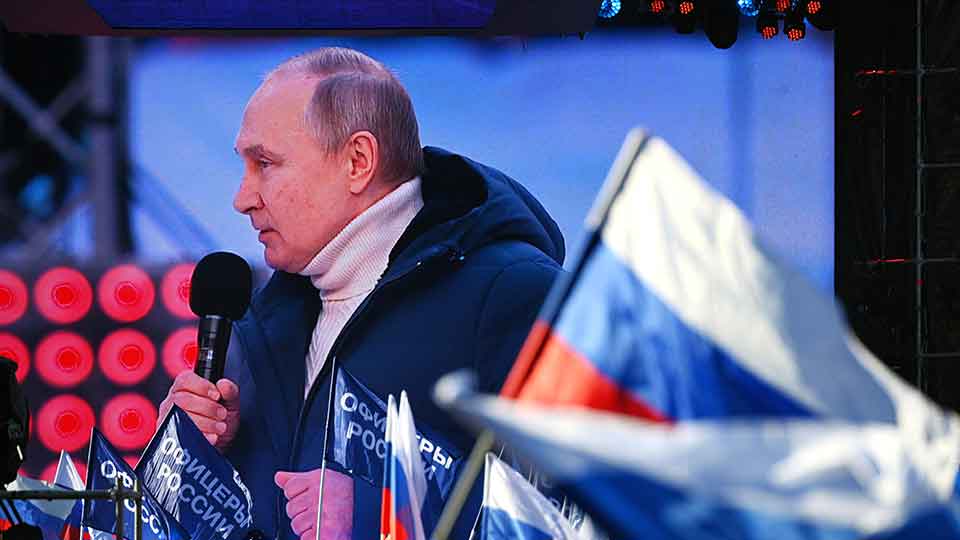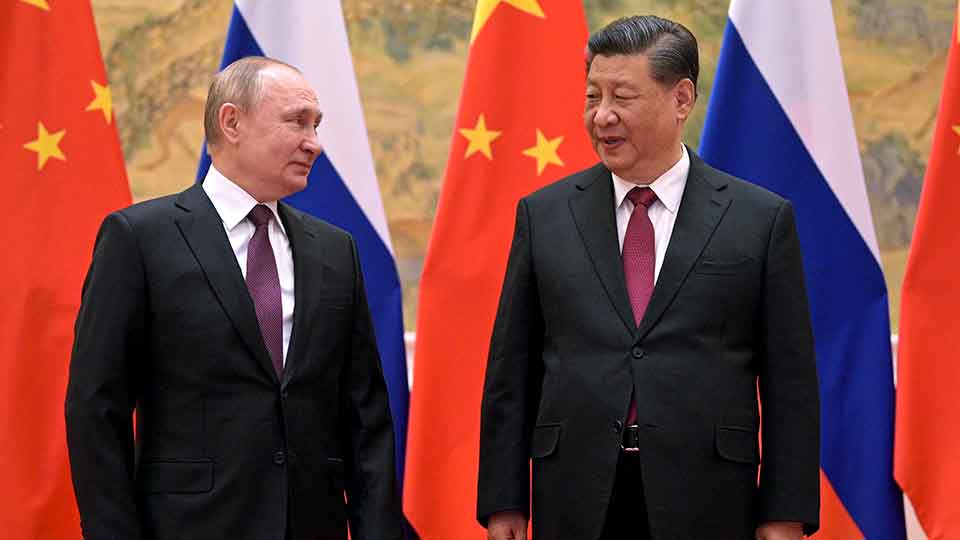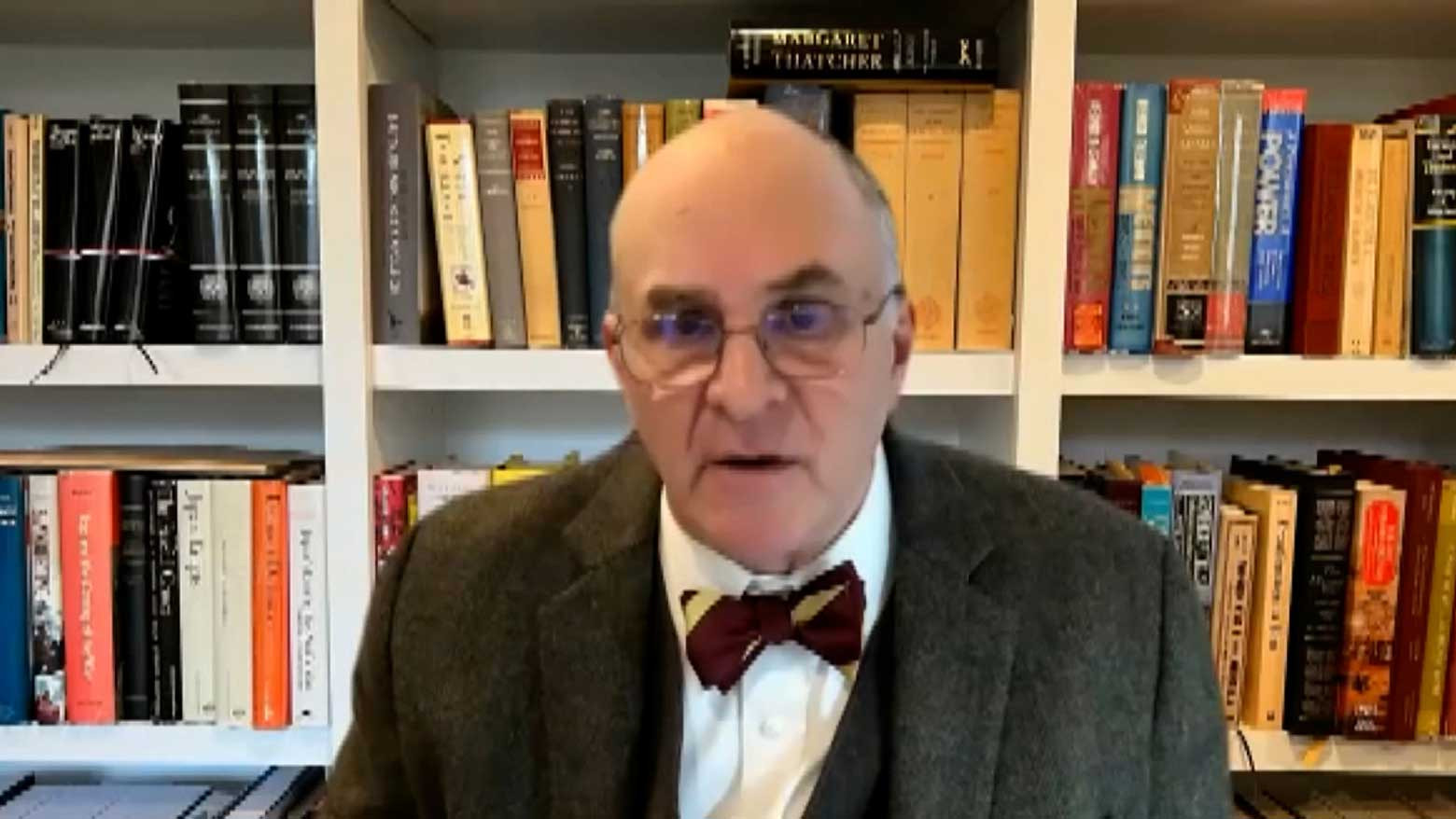Miki Ebara: What does this event mean to the world?
Eliot A. Cohen: This is brutal, first and foremost. We've seen a level of wanton violence directed against civilians that you'd really have to go back to World War II [to see]. This is particularly stark and extremely dangerous because it's really setting back the norms of behavior in a very profound way. This is really a criminal effort to crush another state. And a major state. People need to remember that Ukraine is bigger than France. It's got a population of 42 million people. It is of vital importance that the Russians be stopped and that Ukraine return to an independent and prosperous state.
Ebara: What's your assessment of the massive sanctions now slapped on Russia?
Cohen: Normally I'm pretty skeptical about sanctions, but I must say that I've been surprised. We've been willing to do things we've never been willing to do before, particularly kicking the Russians out of some parts of the SWIFT international financial transfer system. Companies like Netflix or Microsoft are leaving Russia. Why are they doing it? They may be afraid that they could end up running foul of sanctions, or they may be under a lot of pressure from customers, employees and stakeholders. The result is that Russia's really being completely shut out of the international economy. Now, the problem is that the sanctions won't really fully bite for some period of time—probably months—and for the time being the Russian government has the means of repression to prevent this from boiling over. But I suspect that it could boil over in the form of popular protest and elite discontent with Putin and his regime.
Ebara: Who is winning so far?
Cohen: I don't think you can really say simply that one side is winning or losing. On one hand, let's start with the Ukrainians. They are suffering terribly—children being massacred, hospitals being bombed; really a completely unprovoked assault. Putin has made it clear that he doesn't think Ukraine deserves to exist as a state. But the Ukrainians’ spirit is magnificent. They've had some quite extraordinary successes against a superior force. So there's a spiritual sense almost in which you could say that they're winning. And indeed, I would argue militarily, too, they've had some quite remarkable successes.
One way you could say the Russians are winning: they've taken parts of Ukraine. But they're clearly taking serious casualties. They are clearly worried about domestic discontent. They've admitted that they've sent conscripts to Ukraine and they know that the Russian public won't stand for that. And their economy is about to be reduced to a shambles. So in many ways I think they're the losers.
And I don't think Putin can achieve his political objectives. Now, even if he occupies all of Ukraine, even if he kills Zelenskyy, he can't achieve his objectives. I would say the European states have actually been successful in recovering a sense of purpose for NATO above all—a commitment to their own defense and solidarity with the Ukrainians.
Ebara: Do you think the way the US has dealt with Russia, while turning the focus of foreign policy to China, has contributed to how Putin is behaving now?
Cohen: I think the big failure was that we saw signs of this in the Georgia war in 2008, in the seizure of Crimea, in Russian operations in Syria, and even before that, in the destruction of Grozny. And each time we made excuses or decided not to pay much attention and let it go. That helped teach Putin that he could get away with it.

President Trump was quite sympathetic to Putin. He was completely unsympathetic to the Ukrainians and unsympathetic to the Europeans and he dragged his party along with him. I'm also very critical of how the Biden administration handled the withdrawal from Afghanistan. I think the nature of that debacle probably encouraged Putin to think that the Americans wouldn't stand up to him.
Ebara: What are the best and worst-case scenarios?
Cohen: The best scenario is that Putin drops dead of a heart attack tomorrow. But the way [the way the war could end] most quickly is in the Russian military performance. They've been taking a lot of casualties. We know this is beginning to arouse concerns domestically. They don't have deep reserves of manpower. Their reservists are people who haven't been in uniform in years, unlike the Americans or the Israelis who train for 30 or 40 days a year. You would see increasing concern at home, particularly if the economic sanctions bite faster than expected—if lots of factories, for example, are shutting down because they can't get Western parts and people are thrown out of work and all of a sudden the ruble can't buy very much, then mass discontent would emerge and it would surprise everybody. So, I think that's really the best outcome. It is conceivable to me that Putin could hang on for quite a while if they could mitigate the sanctions, if the Chinese find some way to weaken their effect, if he is suddenly more successful in Ukraine, if they were able to take these cities more easily, if the NATO Alliance fell apart in some traumatic way, then this could go on a lot longer. But I do think [Putin] has put himself in a position where he's actually not going to be able to win.
Ebara: Where do you see China coming into the picture?
Cohen: It's a good thing if China sees that Western democracies can get their act together and the United States can lead all that. So much of the Chinese view has been based on the assumption of China's peaceful rise and America's decline. If we can reverse that narrative inside their heads, that would be a tremendous strategic accomplishment. And it's very important. Xi Jinping and Putin are both dictators, who have been in power for a long time. They both have a kind of “national greatness” agenda. They both have a smaller country that they think belongs to them. They both are antagonistic to the US, but I think there are limits.

First, the Chinese have to be looking at the Russians and saying, these guys are not particularly competent. They told us they were going to run over that country in a couple of days. And instead, they keep on getting hammered. Chinese companies will be thinking about whether they want to do business in Russia if they're going to get hit with sanctions. If you're a Chinese businessman, if you're the Chinese government, you have a choice between doing business in Russia—a country with the GDP of Italy—or doing business with the US and all of the West. That’s not much of a choice.
More deeply, there is a big difference in outlook, I believe, between Putin and Xi. Putin wants to smash the international system, but the Chinese want to bend it in their direction. I don't think the Chinese really want to see the global order turned upside down. So, I think they'll align with Russia, they’ll be supportive, but they're not going to be brothers. And built into that relationship is Russian fear of China, Russian fear of Chinese demographics, of its economic dynamism, which it doesn't have and never will, and Chinese contempt for Russia, which you can already see.
Ebara: What lessons would you think the Chinese leadership is drawing from this?
Cohen: The Chinese are very good at systematically learning lessons. One of them should be that the Americans may know more than you think they know about what you’re doing. I mean, the Biden administration was quite brilliant in the way it selectively released information during the buildup to the invasion. A lesson that China should learn is actually all this very clever information warfare. It works. In the information domain, the Russians are getting crushed and they're getting crushed by the Ukrainians, they're getting crushed by us. And they're also getting crushed by networks of hackers and so on who hate them. The Chinese have to be thinking that could come their way as well. But the real issue would be the Taiwanese. [I think Taiwan needs to look at this] and say we'd like to be like the Ukrainians, but do we have that kind of commitment to our own freedom? Or will they say they don't want to pay that price? That, I don't know.

